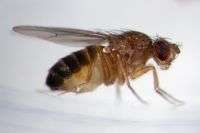August 20, 2012 report
Researchers discover how fruit flies learn to bypass already mated females

(Phys.org) -- Researchers have known for some time that young male fruit flies learn over time to bypass females that have already mated with someone else, but until now, no one really understood the mechanism involved. Now a team from Austria has discovered, as they write in their paper published in the journal Nature, that the when male fruit flies mate with females, they leave behind a bit of pheromone that serves as a signal to other males letting them know that further mating is futile.
To come to these conclusions, the team ran a series of experiments to conclusively demonstrate exactly what was going on with the fruit flies. To begin, they first isolated the pheromone they thought was involved, cVA. Pheromones are chemicals produced by an organism that are believed to serve a signaling purpose when they are noted by others. In studying the fruit flies, the team noted that small amounts of cVA were deposited onto to the bodies of females, by males, during mating.
To find out if cVA was serving as a signal for other males, the researchers modified several of them to prevent them from being able to smell or sense the presence of cVA. Those males then attempted to mate with females that had already mated, in essence demonstrating an inability to learn to tell the difference between mated and unmated females.
In another experiment, the researchers genetically altered several female fruit flies to cause them to produce cVA on their own. This caused all the males (that had learned to do so) to bypass them.
These two experiments convinced the team that it was the depositing of cVA on the females that signaled to latter males that the female was already mated and thus attempting to do so would be futile; they should instead move on. But that still didn’t explain how the young males learned to recognize the signal. To uncover that mystery, the team looked at dopamine levels in the brains of the fruit flies.
In humans, dopamine is a pleasure chemical, it’s what drives cocaine addiction. But in insects such as the fruit fly, dopamine has been shown to be involved in learning. As the young males come into contact with the females for mating purposes, dopamine levels fluctuate, causing them to learn to associate rejection with the sensing of the cVa pheromone, which in turn leads them to avoid those already mated females to focus on the virgins instead.
This bit of research shows that even the lowly fruit fly can learn based on environmental conditions and to adjust its behavior accordingly, which means, everything for them is not hard-wired.
More information: Dopamine neurons modulate pheromone responses in Drosophila courtship learning, Nature (2012) doi:10.1038/nature11345
Abstract
Learning through trial-and-error interactions allows animals to adapt innate behavioural ‘rules of thumb’ to the local environment, improving their prospects for survival and reproduction. Naive Drosophila melanogaster males, for example, court both virgin and mated females, but learn through experience to selectively suppress futile courtship towards females that have already mated1. Here we show that courtship learning reflects an enhanced response to the male pheromone cis-vaccenyl acetate (cVA), which is deposited on females during mating and thus distinguishes mated females from virgins. Dissociation experiments suggest a simple learning rule in which unsuccessful courtship enhances sensitivity to cVA. The learning experience can be mimicked by artificial activation of dopaminergic neurons, and we identify a specific class of dopaminergic neuron that is critical for courtship learning. These neurons provide input to the mushroom body (MB) γ lobe, and the DopR1 dopamine receptor is required in MBγ neurons for both natural and artificial courtship learning. Our work thus reveals critical behavioural, cellular and molecular components of the learning rule by which Drosophila adjusts its innate mating strategy according to experience.
Journal information: Nature
© 2012 Phys.org



















